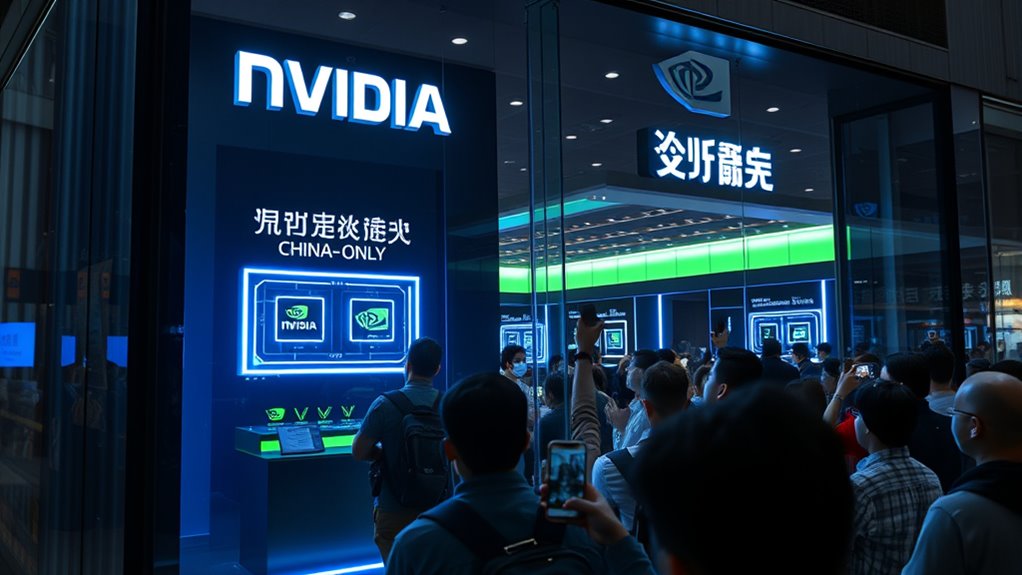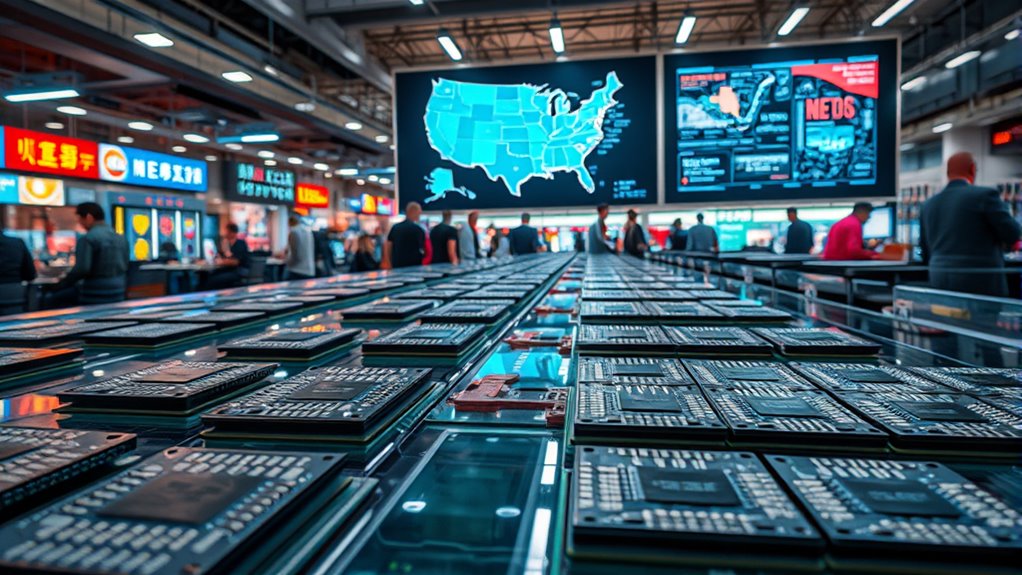Nvidia is bypassing U.S. export restrictions by selling China-only AI chips designed specifically for the Chinese market. These region-specific chips help Nvidia maintain sales and meet growing demand in China while avoiding direct violations of trade bans. This strategy allows the company to continue expanding its presence despite restrictions. If you want to understand how this development impacts global technology and market dynamics, there’s more to uncover ahead.
Key Takeaways
- Nvidia offers region-specific AI chips tailored for China to bypass U.S. export restrictions.
- These “China-only” chips are unavailable outside China, maintaining regional exclusivity.
- The strategy allows Nvidia to continue AI chip sales and meet rising demand in China.
- Customization helps Nvidia circumvent export bans without directly violating U.S. policies.
- This approach highlights industry adaptations to restrictions and may influence future market strategies.

Did Nvidia find a way around the U.S. ban? It seems so, at least on the surface. The company has started selling what it calls “China-only” AI chips, effectively sidestepping export restrictions that were meant to limit its technology’s reach into certain markets. These chips are designed specifically for Chinese customers and are not available elsewhere, which allows Nvidia to maintain its chip sales growth despite the restrictions. By tailoring products for a restricted market, Nvidia can continue to generate revenue from the Chinese sector without directly violating U.S. policies. This move raises questions about how effective export restrictions truly are when companies get creative with their product offerings.
You might wonder whether this approach is sustainable or if it’s just a temporary workaround. The truth is, Nvidia’s strategy highlights a broader trend in the tech industry: firms are finding ways to adapt to and circumvent export restrictions to protect their chip sales. These restrictions were initially meant to slow the transfer of advanced technology to certain countries, but companies like Nvidia are pushing back by developing region-specific products. In this case, the China-only AI chips allow Nvidia to keep its sales thriving in a vital market while avoiding the bans that restrict the sale of more advanced, globally available chips. It’s a delicate balancing act, but one that seems to work for now.
You should also consider how this impacts the global chip market. The restrictions aimed to limit China’s access to high-end AI hardware, but Nvidia’s move suggests that the market is more flexible than policymakers anticipated. By creating tailored chips, Nvidia not only maintains its chip sales volume but also preserves its competitive edge in AI technology. This could, in turn, put pressure on other companies to develop similar region-specific solutions, further complicating the enforcement of export restrictions. Meanwhile, Chinese companies may benefit from this, gaining access to chips optimized for their local needs, which could boost their own AI capabilities.
Frequently Asked Questions
How Does Nvidia Verify the Chips Are Sold Only in China?
You’re responsible for ensuring Nvidia verifies the chips are sold only in China. They do this by implementing strict export controls and maintaining supply chain transparency, tracking every step from manufacturing to sale. Nvidia uses advanced monitoring systems and compliance checks to restrict chip distribution. These measures help them prevent unauthorized exports and comply with regulations, giving them confidence that the chips stay within China’s market while avoiding U.S. restrictions.
What Are the Potential Legal Risks for Nvidia?
You face legal risks if Nvidia mishandles export controls or infringes on intellectual property. If they export chips illegally or misuse proprietary technology, they could be fined or face sanctions. Ensuring strict compliance with export controls and protecting intellectual property rights is essential. Failing to do so might lead to lawsuits, reputational damage, or penalties, risking the company’s ability to operate internationally and undermining trust with partners and regulators.
Could This Strategy Affect Nvidia’s Global Reputation?
You might wonder if Nvidia’s China-only AI chips could tarnish its global reputation. This strategy raises questions about corporate ethics, especially if seen as circumventing U.S. restrictions. While it might boost sales in China, it could also lead to distrust internationally. Your perception of Nvidia’s integrity could shift, affecting its long-term reputation and relationships with global partners who value transparency and adherence to regulations.
Are Other Companies Using Similar Tactics to Bypass Bans?
Yes, other companies also use corporate evasion and exploit regulatory loopholes to bypass bans. They often find creative ways to continue operations in restricted markets, like creating separate subsidiaries or modifying products for specific regions. These tactics help them maintain profits and market share, but they can damage their reputation if exposed. You should stay aware of these strategies, as they reveal how firms navigate complex regulations worldwide.
What Is the Long-Term Impact on U.S.-China Tech Relations?
You know what they say, “A chain is only as strong as its weakest link.” The long-term impact on U.S.-China tech relations could lead to a push for greater trade diplomacy and technological sovereignty. As companies find ways around restrictions, tensions might escalate, prompting both sides to develop more autonomous tech ecosystems. This ongoing game of cat and mouse risks deepening mistrust, potentially hindering cooperation and innovation in global tech development.
Conclusion
You see Nvidia finding ways to adapt, to innovate, to navigate the restrictions. You watch as they develop China-only chips, as they shift strategies and explore new markets. You notice how they balance compliance with ambition, challenges with opportunities, limits with possibilities. You realize that in this game of supply and demand, of restrictions and innovations, Nvidia keeps moving forward, pushing boundaries, shaping futures. You understand that in this race, resilience and ingenuity are your greatest allies.











